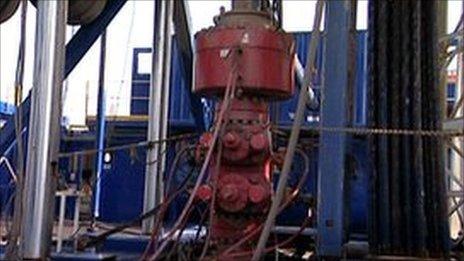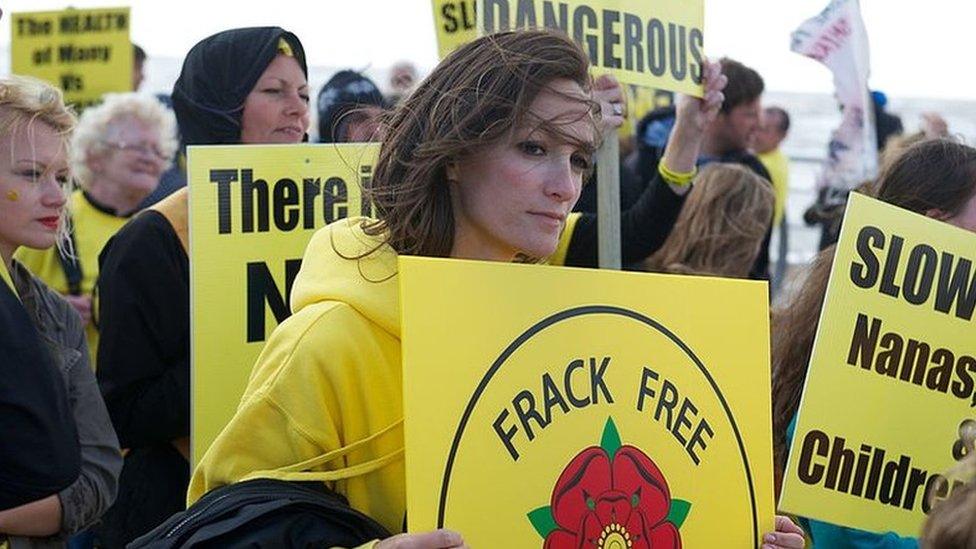Cuadrilla Lancashire fracking application 'should be refused'
- Published
The BBC's Judith Moritz spoke to villagers about their fears about fracking
Fracking should not go ahead at two sites in Lancashire, a key report said.
The Lancashire County Council report, external follows an application by energy firm Cuadrilla to explore Little Plumpton and Roseacre Wood for shale gas.
It comes a week before councillors are due to make a final decision on the company's planning application to extract the gas near Blackpool.
Cuadrilla chief executive Francis Egan told BBC Radio Lancashire the planners' recommendation was a "set-back".
In a statement, the company said "the limited issues that have been raised can be resolved".
Noise and traffic
The firm's bids were the first since fracking tests near Blackpool were thought to be the "likely cause" of earth tremors in 2011.
The council's report recommended the Little Plumpton application, for a site north of Preston New Road, should be turned down due to concerns over noise, which would "unnecessarily and unacceptably" affect neighbouring properties.
Regarding the Roseacre Wood site, it said there would be an increase in traffic, particularly heavy goods vehicles, which would result in "an unacceptable impact" on rural roads and reduce road safety.
However, applications for monitoring equipment to test seismic activity, groundwater and ground gas at both sites have been recommended for approval by planners.
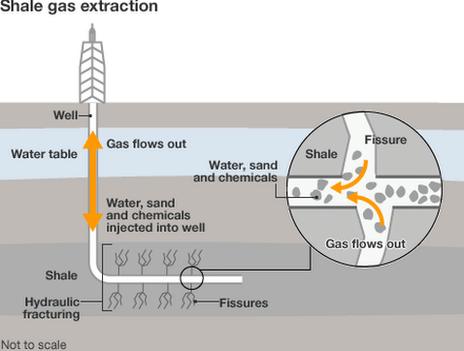
Fracking - or hydraulic fracturing - is a technique in which water and chemicals are pumped into shale rock at high pressure to extract gas.
A government report published in June 2012 concluded fracking was safe if adequately monitored.
However, anti-fracking campaigners claim the process is harmful to the environment.
David Cameron's spokesman said the prime minister's view on the potential for unconventional oil and gas had not changed but he believed it "should be up to local authorities" to take the decision.
Lengthy planning process
Mr Egan said there had been a "degree of scare-mongering" against Cuadrilla's bid.
"On the issues of public health - other than noise - on the issues of air quality, seismicity or earth tremors, the council has concluded that none of those are reasons to refuse this application.
"They have concerns clearly with night-time noise on one, and noise and traffic on the other but that would be the case for any planning application."
BBC industry correspondent John Moylan said the planning process was twice as long as expected, with Cuadrilla's applications stretching to thousands of pages.
He added its protection plans for ground water, air quality and handling waste had been approved by the Environment Agency and its operations were due to be independently scrutinised by scientists from the British Geological Survey and leading universities.

Analysis
Judy Hobson, BBC North West Tonight
Anti-fracking protesters will claim victory after today's report, but the planning committee has the final say when they vote next week.
They are likely to go with what the report's authors have recommended, but even then Cuadrilla can appeal and ultimately the government will decide.
All the noises emanating from the Cuadrilla camp this week suggested they believed this would go through.
Officers said the small rural roads at Roseacre Wood wouldn't be able to cope. Cuadrilla may now decide to try to construct separate roads - and another planning application might be needed. All this points to delays, delays and more delays.
So this isn't a final result. But it is a setback - not just for Cuadrilla and for fracking in Lancashire but potentially for fracking across the UK. Decisions made here could set the scene for the rest of the country.

Greenpeace member Simon Clydesdale said he "applauded" the planners' recommendation, adding "fracking could be a lot of pain for very little or no gain".
"The council now faces a clear choice: They can listen to the planners, and the Lancashire residents that elected them - almost two-thirds of whom want a moratorium on fracking. Or they can kow-tow to the corporate and political interests keen to force through fracking at almost any cost.
"The whole country is looking to Lancashire to protect its communities from the unnecessary risks that fracking plays with our futures."
Friends of the Earth campaigner Helen Rimmer added: "Councillors must now act on this and the tens of thousands of objections they have received and reject Cuadrilla's fracking applications next week.
"Only by doing so will they ensure that fracking is not allowed to cause further climate change while also putting communities and the local environment at risk."
Cuadrilla Chief Executive Francis Egan said that he was surprised by the report
'Serious concerns'
Edward Cook, from the local residents' Defend Lytham group, said it was "delighted" about the planners' recommendations.
But he added: "We are more than a little surprised that the other serious concerns, expressed by the more than 27,000 people who wrote in to object, appear to have been dismissed."
He said concerns included the impact on air quality, public health and greenhouse gas emissions.

Analysis
Steve Becker, BBC Radio Lancashire
Pat Davies could barely contain her joy - or tears - as the planning application failed its first test.
For the last year, her house has become the Little Plumpton Campaign Group's headquarters in their battle against Cuadrilla.
Several members of the group have given up a year of their lives to become full-time opponents.
Meanwhile in Roseacre, Barry and Elizabeth Warner, who campaign with the local Awareness Group, were also jubilant.
"It's often felt like David versus Goliath," Elizabeth said, "but to have planning decisions taken at a local level is absolutely crucial."
Both groups will be at county hall for next week's crucial meetings.

The North West Energy Task Force, a coalition of more than 500 businesses and academics financially supported by Cuadrilla and the firm Centrica Energy, said the planners' recommendation was "potentially a disappointing setback for job creation" in the region.
Local authorities in West Sussex have previously turned down applications from shale companies to explore for oil and gas.
- Published16 January 2015

- Published19 May 2014
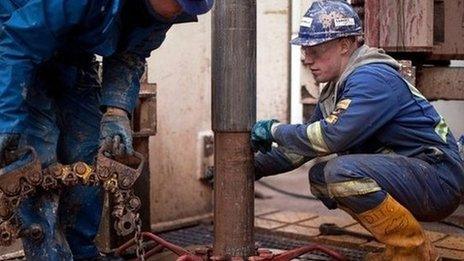
- Published2 November 2011
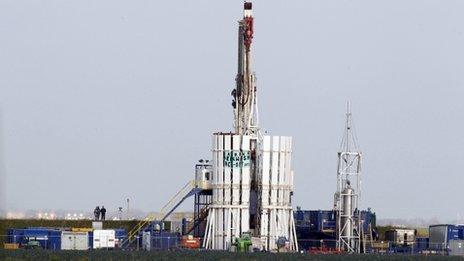
- Published31 May 2011
